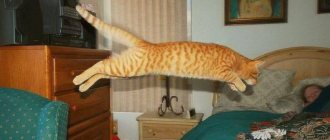Many cats are sociable and active. However, when you suddenly notice that your cat becomes quiet and calm, it could be a sign of sadness.
Many owners fail to recognize the signs of a depressed or sad cat. It is very important for you to know the various causes of sadness in cats and the best ways to make them happy.
Cats are emotional and can become stressed or depressed. The most common signs of an unhappy cat are cowering, hissing, and running away.
But sometimes your cat may not show obvious signs of stress. This is why you, as a pet owner, need to know how cats behave when they are depressed.
Signs of a Sad Cat
Your cat may show subtle signs of stress, making it difficult to notice any changes in behavior. To determine if your cat is unwell, check for these possible signs of depression:
Low energy level
Cats usually sleep a lot. A depressed cat will sleep even more. If you notice a sudden change in your cat's sleep pattern, it means she may be unhappy.
Unusually low energy levels are a red flag for an unhappy cat, suggesting mental or physical problems.
Changes in care
Depressed cats usually stop grooming themselves, leaving themselves unkempt.
Pain
Pain is one of the most underdiagnosed conditions in cats, especially in older adults. This is one of the main clinical signs of depression.
Changes in appetite
If your cat changes its usual eating behavior, it could be a sign of depression. Sad cats may lose interest in their regular diet.
Changing your daily routine
A cat that suddenly changes its behavior may be stressed. Have they stopped using the litter box? Do they leave their usual sleeping area? A sad cat may lose interest in the activity that initially made him happy.
Aggression
A sad cat becomes more aggressive. Examples of aggressive behavior in cats include hissing, biting, chasing, and growling. If you notice this behavior, it may be time to visit your veterinarian.
Folk remedies
Some cat owners advise feeding their pet in such cases. Because after a heavy meal the cat will become lethargic and sleepy. But, firstly, feeding at night can have a negative impact on digestion - there is a high risk that the animal will become very fat and will continue to wake the owner at night to get food. And secondly, this method does not work on all cats - there are individuals known that, having had enough, begin to scream with triple force, falling silent only closer to dawn.
As you know, cats do not like water and try to avoid contact with it, and some owners take advantage of this. So, against a screaming pet they use a regular flower sprayer. This “weapon” can reach your pet at a distance of up to 5 meters. But the animal, not lacking in intelligence, quickly understands where it is simply impossible to reach it with a stream of water, and continues its concerts from there. If, every time the cat starts yelling at night, you take it to the shower, then the animal can catch a cold.
Many cat owners are discovering their own ways to deal with cat shows. For example, smear sour cream on your pet's face - the animal will immediately stop yelling and start washing itself until it eats every drop. Then he might just get tired of washing his face and go to bed. The method, of course, is quite unique, and there is no guarantee that it will work with every cat. There will definitely be those on whom it will not work. But this once again confirms that you can find an approach to every animal.
How to make a cat happy
There are several ways to make your sad cat happy.
These include:
Make time for games. Depressed cats will get rid of their aggression if you play with them.
Pet the cat. Cats love to communicate with their owners (although in the case of cats, you still need to think about who the owners are - cats or people). Your gentle, stroking hand can stabilize an anxious cat without restricting its movement.
Using catnip. Catnip is a plant in the mint family that contains the natural oil nepetalactone, which has unique effects on cats. When cats rub or chew catnip, it produces a mild, natural high that is both safe and temporary, but enjoyable for cats.
Specialist consultations. A certified animal behaviorist may be your best choice to cheer up your pet, as they have the knowledge and experience to treat depressed pets.
When to call the vet. If you notice that your cat is showing signs of chronic depression, stress or illness, you should contact your veterinarian. Your veterinarian may recommend medical intervention or simply change your daily routine.
Signs of a sick cat include:
- Loss of appetite
- Changing your sleep pattern
- Crying or searching
- Need for extra attention
- Overall sad behavior
Meowing at night - what to do about it?
If the cat starts yelling at night, then it is useless to shout and swear at him. Cats have more sensitive hearing than humans, so they perceive loud sounds quite painfully. And they can begin to behave completely unpredictably - for example, throwing flowers from window sills, tearing up furniture, etc. Stress can affect the animal's nervous and digestive system - it can become skittish and afraid of people.
Cat care
Cats are wonderful animals. However, before purchasing one for your pet, you should know what they need and how to make them happy.
Needs of cats. Unlike pets such as a dog, cats do not require much socialization, training, or exercise. They are quite unpretentious.
Cats tend to be more independent and can adapt well if you lead a busy lifestyle. They can also be handy if you live in a small apartment or house.
How to stop your cat from being sad. There are several ways to protect your cat from sadness:
Buy toys for your cat
Toys will keep your cat busy and tired, thereby getting rid of excess energy.
Keep cats in pairs
This will help improve communication and find playmates, reducing or preventing stress.
Let your cat "hunt"
Imitating hunting behavior keeps cats mentally stimulated and active.
Walk the cat
Exercising your cat will help you get rid of excess energy and stress. Contact a professional trainer to teach your cat how to walk on a leash.
The main reasons why cats shit in inappropriate places
The furry creatures torment their owners with their bad habit with depressing consistency or from time to time. As a rule, this is explained by the following factors:
- the cat is not litter box trained;
- the cat does not like the place where the tray is installed;
- the cat has complaints about the shape or filling of the tray;
- the tray is dirty;
- Competitors living in the house claim the tray;
- the cat is stressed;
- the cat has health problems;
- age problems;
- the cat wants to go for a walk.
Depending on the reason, you should choose a method by which you can ensure order and cleanliness in the house.
Signal of a foreign body entering the digestive tract
Most owners often encounter this problem, which is especially typical for playful cats of long-haired breeds. These could be small fragments of toys, small bones, or simply large accumulations of fur from the animal itself. The main signs for identifying this factor are attacks of vomiting that occur when drinking water and food, abdominal pain and difficulty defecating. With prompt diagnosis and timely removal of the foreign material, the pet will recover completely.
Factors provoking the disorder
The factors that most often provoke the development of nervous disorders in domestic cats, veterinary experts include the following moments in the life of an animal:
- moving to a new place;
- change of owner;
- traveling by car or public transport;
- visit to the veterinary clinic;
- exhibition events;
- the appearance of another animal in the house;
- the arrival of a new family member;
- weaning kittens from their mother cat;
- changing furniture in the room;
- new tray, bowl, filler;
- change of food or diet;
- guests or a noisy party;
- fireworks, firecracker explosions.
A special group of provoking factors includes physical ailments of the pet. Experiencing pain and discomfort, the cat feels fear and helplessness.
Emotional distress over the loss of an owner or companion animal causes deep neuroses that last for months.
Not all cats develop a nervous disorder; individual mental characteristics are of paramount importance in this illness. Some animals calmly react to noisy companies, do not notice changes in the environment, and feel comfortable in a car.
The nervous system of other pets reacts negatively even to changing the usual litter box. Owners need to take these features into account when keeping cats, be able to recognize the symptoms of neuroses and provide timely assistance.
Re-education of kittens
Everything is easy and relaxed with a kitten - there is no need to retrain him. First you need to watch the cat and wait until he wants to go to the toilet.
Blot the puddle with a cloth or toilet paper and transfer it to the tray. Then wipe up the puddle and treat the area with bleach.
The tray should be in the room where the kitten peed. Pour a little litter into the litter box, put that cloth there, then take the cat to the litter box. He must remember where the tray is located.
IMPORTANT! During the first week, you should not wash your cat’s litter box, as he is guided by the smell. You can wash the tray only if your pet has worms.
The cat wants something
One of the reasons why cats follow their owners' heels is because they want something. If your kitten is chasing you shortly before eating, he is probably expecting that you are going to give him some tasty food soon. This behavior is also obvious if you are heading to the kitchen. In this case, the following is accompanied by constant meowing.
Additionally, your cat may ask to play for a bit. The cat thinks that following you will attract your attention and finally the game will begin. Sometimes your cat will carry a toy to entice you to play.
© shutterstock
Getting rid of stains and odor
How to remove odor and stains? They are eliminated using special products that are sold in pet stores or folk remedies. In this case, you will have to treat every area in the room. The process is quite labor intensive. To avoid a situation where a cat shits on the bed, it is necessary to wean the animal from a bad habit.
Folk remedies
It is difficult to remove stains and unpleasant odors from the bed. This is especially true for marks. Folk remedies used to get rid of odor:
- The aroma of citrus fruits repels cats, and the acid helps neutralize odors. To do this, squeeze lemon juice, dilute with a glass of boiled water, wipe the surfaces;
- Dilute vinegar removes stains and odors well;
- Baking soda with hydrogen peroxide 3% (suitable for hard surfaces only);
- Alcohol or vodka – thoroughly wipe the stained area with a sponge soaked in vodka or alcohol;
- Potassium permanganate - will eliminate odor, but is only suitable for dark-colored fabrics, not delicate ones.
Under no circumstances should you use bleach to eliminate odors. The product will worsen the situation and may act as a sleeping pill on cats.
Lemon juice
Vinegar
Baking soda and hydrogen peroxide
Alcohol
Potassium permangantsovka
Radical methods
Radical methods are started when there is nothing else left. If the owner does not intend to breed cats, the best option would be castration for cats or sterilization for cats. The procedure should help, and the cat will stop marking the territory. It is important that the animal be neutered before it has contact with the cat. Otherwise, this radical method may not help. Males are usually neutered before the age of 1 year. After the procedure, it will take several more months before the animal stops marking. During this time, the body undergoes a restructuring.











